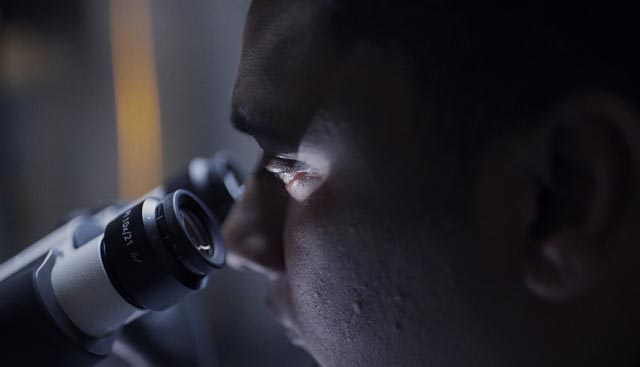Vulvar Cancer

A relatively rare and slow-growing malignancy, vulvar cancer develops in the outer surface of the female genitalia (vulva). The vulva includes the vaginal opening, labia majora (outer lips), labia minora (inner lips), Bartholin’s glands and clitoris. Most often, the cancer affects the labia.
The causes of vulvar cancer are not well understood. In general, the cancer forms when healthy cells in the vulva undergo abnormal DNA changes that cause them to grow and divide very rapidly. The resulting excess cells can accumulate and form a mass or tumor, which may become cancerous and spread to other areas of the body.
Types
Vulvar cancer is classified by the type of cell in which the cancerous changes originated. Along with many other factors, physicians consider the classification of the cancer when evaluating treatment options.
The types of vulvar cancer include:
- Squamous cell carcinoma. A type of skin cancer that forms in the thin, flat cells that line the vulvar surface.
- Verrucous carcinoma. A subtype of squamous cell carcinoma that resembles a wart.
- Adenocarcinoma. A malignancy that that forms in the mucus-secreting Bartholin’s glands or the vulvar sweat glands, usually on the sides of the vaginal opening.
- Melanoma. A type of skin cancer that forms in the pigment-producing cells of the vulvar skin, usually on the clitoris or the labia minora.
- Sarcoma. A tumor that forms in the connective tissue beneath the vulvar skin.
Squamous cell carcinoma of the vulva is by far the most common type of vulvar cancer.
Symptoms
Usually, vulvar cancer progresses very slowly and may not produce any symptoms in its early stages. Some possible signs include:
- Persistent itching, pain or burning in the vulvar area
- A patch of vulvar skin with an unusual texture or color
- A lump or enlarged lymph node in the vulvar area or groin
- Painful urination
- Unusual vaginal discharge
- Vaginal bleeding between menstrual periods
- An ulcer on the vulva that does not go away within a few weeks
- A change in the appearance of an existing mole on the vulva
- Wart-like growths that resemble genital warts
In addition to vulvar cancer, many of these symptoms can have other, less serious causes. Therefore, it is important to promptly discuss any unusual changes with a physician who can provide an accurate diagnosis and, if necessary, appropriate treatment.
Diagnosis
For a vulvar cancer diagnosis, a physician will typically begin by performing a thorough physical examination, including a pelvic exam. After visually assessing the vulva, the physician will manually feel the vagina, uterus, ovaries, bladder and rectum to check for abnormalities.
Based on the findings of the physical examination, the physician may order one or more of the following tests to confirm a vulvar cancer diagnosis:
- Biopsy. A physician removes a small amount of suspicious vulvar tissue, then sends the sample to a lab to be examined by a pathologist under a microscope for evidence of cancer.
- Colposcopy. Utilizing a special instrument (colposcope), which provides a lighted and magnified view of the surface of vulva, vagina and cervix, a physician visually checks for abnormalities.
- Imaging. A computed tomography (CT) scan, positron emission tomography (PET) scan or magnetic resonance imaging (MRI) scan can help a physician measure and evaluate a tumor. A chest X-ray can help a physician determine if vulvar cancer has spread to the lungs.
- Endoscopy. A physician inserts a thin, lighted tube (endoscope) into the urethra and bladder or the anus and rectum to visually check for abnormalities.
Risk factors
While the specific causes remain unclear, researchers believe the following factors may increase the risk of developing vulvar cancer:
- Human papillomavirus (HPV)
- Smoking
- A weakened immune system
- Certain precancerous conditions of the vulva, such as vulvar intraepithelial neoplasia (VIN)
- Certain skin conditions affecting the vulva, such as lichen sclerosus
Moffitt’s approach to treating vulvar cancer
At Moffitt Cancer Center, women with vulvar cancer can receive comprehensive treatment and support. We recognize that our patients’ time is valuable, so we offer access to every specialist, test and treatment in a single, convenient location.
A key factor that distinguishes Moffitt’s gynecological clinic from other treatment centers is our multispecialty team, which focuses exclusively on vulvar cancer. Our gynecologic oncologists are highly specialized, and each expert has completed the rigorous process of attaining board certification in his or her area of specialty.
Moffitt remains abreast of research developments so that we can offer our patients the very latest advances in vulvar cancer treatments, including the promising new options available through our clinical trials. Our groundbreaking research has directly led to better outcomes and quality of life for our patients, and our efforts are recognized by the National Cancer Institute, which has awarded Moffitt the prestigious designation of Comprehensive Cancer Center.
In the gynecologic clinic at Moffitt, we take a unique and highly individualized approach to vulvar cancer treatment by utilizing evidence-based clinical pathways. These best practice guidelines:
- Outline the entire trajectory of the condition
- Detail all available treatment options, including the latest advances in chemotherapy, radiation therapy and surgery
- Allow physicians to make better decisions along the way by taking into account risk/benefit ratios and patient preferences
In sum, Moffitt treats vulvar cancer patients as individuals, not numbers.
Whether you are newly diagnosed, seeking a second opinion, experiencing a recurrence, in need of a complex surgical procedure or simply seeking more information about vulvar cancer, Moffitt Cancer Center is here to help. To request an appointment, call 1-888-663-3488 or complete our new patient registration form. We do not require referrals.
